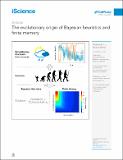The evolutionary origin of Bayesian heuristics and finite memory
Author(s)
Lo, Andrew W; Zhang, Ruixun
DownloadPublished version (2.008Mb)
Publisher with Creative Commons License
Publisher with Creative Commons License
Creative Commons Attribution
Terms of use
Metadata
Show full item recordAbstract
Bayes' rule is a fundamental principle that has been applied across multiple disciplines. However, few studies have addressed its origin as a cognitive strategy or the underlying basis for generalization from a small sample. Using a simple binary choice model subject to natural selection, we derive Bayesian inference as an adaptive behavior under certain stochastic environments. Such behavior emerges purely through the forces of evolution, despite the fact that our population consists of mindless individuals without any ability to reason, act strategically, or accurately encode or infer environmental states probabilistically. In addition, three specific environments favor the emergence of finite memory-those that are Markov, nonstationary, and environments where sampling contains too little or too much information about local conditions. These results provide an explanation for several known phenomena in human cognition, including deviations from the optimal Bayesian strategy and finite memory beyond resource constraints.
Date issued
2021Department
Sloan School of Management. Laboratory for Financial Engineering; Sloan School of Management; Massachusetts Institute of Technology. Computer Science and Artificial Intelligence LaboratoryJournal
iScience
Publisher
Elsevier BV
Citation
Lo, Andrew W and Zhang, Ruixun. 2021. "The evolutionary origin of Bayesian heuristics and finite memory." iScience, 24 (8).
Version: Final published version